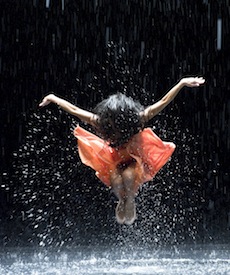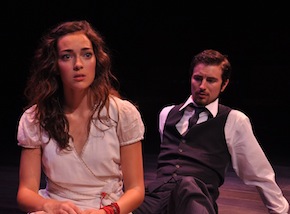Festival Opera: A Challenge Bigger Than Funding
 Money problems have caught up with the Walnut Creek company, and it will have to go without a production in 2012. The announcement says it will be "a transitional year."
Money problems have caught up with the Walnut Creek company, and it will have to go without a production in 2012. The announcement says it will be "a transitional year."
Artistic Director Michael Morgan sees the situation in a broader context than funding:
Even if times were great, the company really needs to reassess its mission. Audiences have been declining for the standard repertory, but we've never set out a consistent vision that could both retain the core audience and attract new fans.In the announcement, the company quotes Morgan that "In difficult times, we need the arts more than ever," and appeals for support because "it's at times like these that we need your support more than ever."For every bold step the company would take, there was an equally timid one made out of fear of losing a shrinking audience. For all the company's artistic excellence, this is not the way you build an enthusiastic following or entice people to come out to Walnut Creek; the local audience for opera there simply isn't big enough.
Well-meaning timidity is not the way to build up a small company. I offer as contrast the exciting work of Ensemble Parallele, West Edge Opera, and the more unusual offerings of West Bay Opera.
I hope Festival Opera can transition into something more vital and sustainable. I wholeheartedly support the idea of smaller, mobile productions that can get out into the community and find out whether there is an audience to attract.
Morgan is planning to present "smaller-scale performances to the community," bring back Opera in the Park, and "do everything we can to help create the next generation of opera and arts enthusiasts."
For the conductor, this situation follows the cancellation of the Sacramento Opera season for 2010-2011, but there Morgan, who is music director of the Sacramento Philharmonic, is bringing back opera to the city with concert performances.
Festival Opera Executive Director Sara Nealy wants to make it clear "by no means are we throwing in the towel; in fact, we are in the process of reinventing Festival Opera to be a more sustainable company, one that is even more connected to the community." Using a Hearst Foundation grant just received, the company administration is working on new plans. Nealy regards the grant as "a vote of confidence in what Michael and I presented as our path."
In this busy-absent holiday period, it's nearly impossible to get other responses to the Festival Opera situation, but Music News will follow up both in comments to this column, and when publication resumes in 2012.
ODC/Dance Sets Spring Season
 That would be season No. 41, still under the guidance of founder Brenda Way — an amazing record of persistence and excellence in the daunting world of modern dance by a company that not only dances, but employs musicians and commissions scores.
That would be season No. 41, still under the guidance of founder Brenda Way — an amazing record of persistence and excellence in the daunting world of modern dance by a company that not only dances, but employs musicians and commissions scores.
Also called the Downtown Season (because of its Yerba Buena location) and Home Season (to distinguish it from the company’s busy touring schedule), the March 15–25 ODC Spring Season includes three world premieres; original music by cellist Zoe Keating, performed live; and bicycle art by Max Chen.
Way’s new work is Breathing Underwater, with cellist Keating performing the music live. Co-Artistic Director KT Nelson’s premieres are Cut Out Guy, with music by experimental composer Ben Frost, and Transit, in collaboration with Chen.
Cut Out Guy is said to “explore the fierceness and vulnerability in men.” Frost, an Australian musician and composer now based in Reykjavik, Iceland, is best known for his building-shaking experiments in electronic music.
Transit is a full-company work, “celebrating the chaotic pulse of urban centers.” Dancing with three custom-built bicycles by Chen and a musical score by Nico Muhly, the piece “rides through the shape of a day: a coffee fix, the commute, lunch, and the evening return home.”
Rounding out the 2012 season will be revivals of Way’s 2002 Raking Light to a commissioned score by Jay Cloidt and her 2006 Part of a Longer Story (set to the Mozart Clarinet Concerto), as well as ODC Associate Choreographer Kimi Okada’s 2011 I look vacantly at the Pacific ... to music by Cloidt and Shoukichi Kina.
Company dancers in 2012 are Daniel Santos, Anne Zivolich, Yayoi Kambara, Corey Brady, Jeremy Smith, Vanessa Thiessen, Dennis Adams, Justin Andrews, Amy Foley, and Natasha Adorlee Johnson.
Zhang Yimou's Musical Fusions
 One of the great films of all times, Zhang Yimou’s Hero, about China’s first emperor, has a dramatic soundtrack by Tan Dun, with Yo-Yo Ma and Itzhak Perlman as soloists, along with guqin master Xu Kuanghua.
One of the great films of all times, Zhang Yimou’s Hero, about China’s first emperor, has a dramatic soundtrack by Tan Dun, with Yo-Yo Ma and Itzhak Perlman as soloists, along with guqin master Xu Kuanghua.
Now that Zhang has a new epic film, to be released on Friday, once again he is bringing the music of East and West together.
The soundtrack for this film, The Flowers of War, is by Chen Qigang, and the violin soloist is Joshua Bell. Chen was music director of the 2008 Beijing Olympics, whose massive and spectacular opening and closing ceremonies were produced by Zhang.
Going back further, Chen composed the score for Zhang’s 1991 Raise the Red Lantern, the music also serving for the ballet of the same name. Among his many works, Chen’s erhu concerto, Reflections of a Vanished Time, is a standout.
Its story of Nanking, whose occupation by Japanese forces in 1937 resulted in an estimated quarter million civilian casualties and some 80,000 rapes, has been told in documentaries and feature films, but the epic scale of Zhang’s film is unprecedented.
And yet, at 2 hours and 25 minutes, with a large cast, a $100 million budget, and Zhao Xiaoding’s panoramic cinematography of the ravaged city, The Flowers of War focuses on individuals, similarly to Steven Spielberg’s Schindler’s List. It is a personal and character-based film against the vast canvas of a historical monstrosity.

The story of people caught in this catastrophic event, Zhang says, is “more important than the background or history of the Nanking Massacre. The most important thing we can take away from it is what it says about human nature, love, and sacrifice. These are the things which are truly eternal.”
The plot revolves around a sleazy American undertaker trapped in a Western cathedral, along with convent students and prostitutes escaping from the city. The building should be off-limits to Japanese soldiers, but, at first, they disregard extraterritoriality.
The American, portrayed by Christian Bale, is caught in the robe of the priest he had come to bury, and he is forced — by circumstances and conscience — to do good in a place where he had gone to do well.
The student through whose eyes the story is seen is 13-year-old Zhang Xinyi, in her first film role. The adult female role introduces Ni Ni in her acting debut; she may well follow the career path of previous Zhang leading ladies, such as Gong Li and Zhang Ziyi.
The Caruso Monkey House Incident
It happened 105 years ago, so how to justify its inclusion in Music News? Let’s just say it’s news to me, certainly in its dazzling complexity. Besides, just the précis of discussion of “The Caruso Monkey House Incident” is worthwhile by itself.
DISCUSSED: Fitzcarraldo, Edward Bernays, The Mysterious Hannah Graham, What Knocko Saw, This Scum from the Lazaretto of Naples, Fire Fighters and Their Pets, Consumptive Loafing, The Melting Pot, A.J. Liebling, Stanford White, Ota Benga the Pygmy
Poor Caruso! He was still recovering from the Great San Francisco Earthquake when, in the same year, he became entangled in a sensational trial, all because of an afternoon in the zoo. Read on.
PINA, a 3D Exception
 3-D movies are expensive to make and cost more to see, the glasses are a bother, and very rarely does the extra dimension add anything to the film; The Adventures of Tintin is a prime example.
3-D movies are expensive to make and cost more to see, the glasses are a bother, and very rarely does the extra dimension add anything to the film; The Adventures of Tintin is a prime example.
But there is one new film in which 3-D makes a difference. In Wim Wenders’ PINA, a superb tribute to the late choreographer Pina Bausch, technology places the viewer in the middle of the dancers, providing a novel, thrilling experience.
The director of Wings of Desire and The Buena Vista Social Club has been working on PINA for some time before her death in 2009. Wenders not only captures the result of Bausch’s work, but also provides insight into her personality and creative process.
The tribute is complete, from Bausch’s startling dance The Rite of Spring to works choreographed to a wide range of music — Mahler, contemporary works, pop. Getting to know each of Bausch’s Tanztheater Wuppertal ensemble “up close and personal” is a huge bonus.
As Bausch used unusual settings, so does Wenders present dances under Wuppertal’s monorail, at a manmade waterfall, in parks, on the street. The unforgettable Café Müller, to music by Purcell, takes place on a bare stage covered with chairs.
PINA, which won accolades at this year’s Berlinale, will open in San Francisco on Jan. 20.
The Sister at SOMArts Cultural Center
 Playwright-director Joel Heinrich collaborates with pianist-composer Hunter Noack to produce The Sister, a drama with live music, in SOMArts’ Bay Gallery, Jan. 11–14.
Playwright-director Joel Heinrich collaborates with pianist-composer Hunter Noack to produce The Sister, a drama with live music, in SOMArts’ Bay Gallery, Jan. 11–14.
Arts graduates are participating in the ambitious production, which takes place in four rooms of the gallery, with the audience physically following the drama from venue to venue. Noack’s score combines original music with “snatches of classical works.”
The Sister, written by Heinrich, tells the story of Hiro and his adopted sister, Alice, who fall in love and unleash an Indian curse that threatens to destroy their family. It is a “tale of forbidden love, belief systems, and taboos.”
